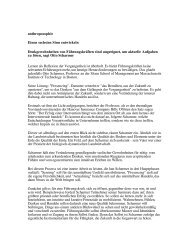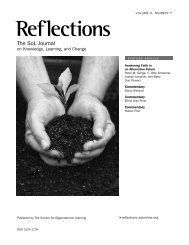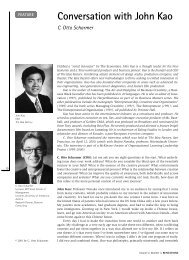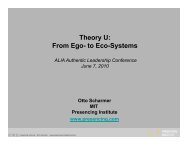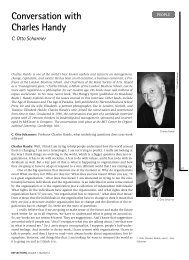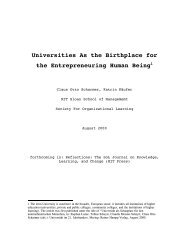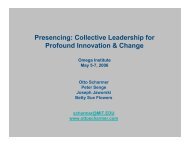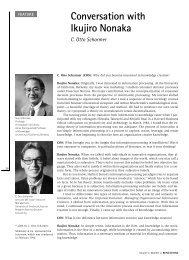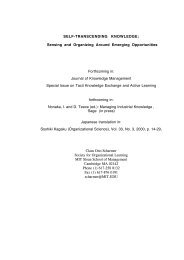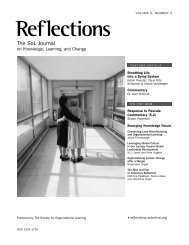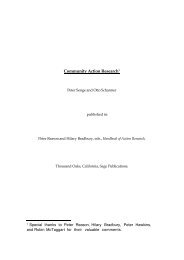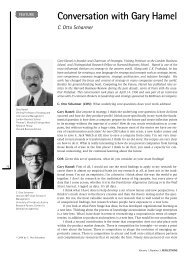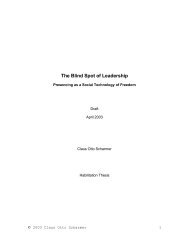Leading from the Emerging Future Minds for Change - Otto Scharmer
Leading from the Emerging Future Minds for Change - Otto Scharmer
Leading from the Emerging Future Minds for Change - Otto Scharmer
Create successful ePaper yourself
Turn your PDF publications into a flip-book with our unique Google optimized e-Paper software.
What did we learn about addressing <strong>the</strong>se issues throughout <strong>the</strong> 20 th century?<br />
What we did in <strong>the</strong> 20 th century is create dedicated singular ministries <strong>for</strong> each of<br />
<strong>the</strong>se problems in government; we created dedicated NGOs <strong>for</strong> each of <strong>the</strong>se issues<br />
in civil society, and we created dedicated university departments and academic<br />
career paths <strong>for</strong> each of <strong>the</strong>se issues. Today we know that this silo type of approach<br />
of one issue at a time isn’t working—on <strong>the</strong> contrary, it seems to be a certain path to<br />
failure.<br />
What sort of leadership will it take to solve <strong>the</strong>m?<br />
With that question in mind, I went to MIT some 15 years ago. Since <strong>the</strong>n I have been<br />
immersed in many large systems change projects and also in research that allowed<br />
me to interview 150 of <strong>the</strong> world’s thought leaders and innovators on profound<br />
innovation and change.<br />
What I learned <strong>from</strong> <strong>the</strong>se years is that <strong>the</strong>re are two fundamentally different<br />
sources of learning. The first is learning <strong>from</strong> <strong>the</strong> past. The second is learning <strong>from</strong><br />
<strong>the</strong> future as it emerges.<br />
All major learning methodologies today reflect on <strong>the</strong> experiences of <strong>the</strong> past,<br />
including those used by Peter Senge, Ed Schein, and Chris Argyris.<br />
But we need more than that. Sometimes <strong>the</strong> past is not very helpful. Sometimes <strong>the</strong><br />
experiences of <strong>the</strong> past are <strong>the</strong>mselves obstacles to coming up with new ideas.<br />
So I set out on a 15-‐year path that led me to <strong>the</strong> conclusion that real innovators<br />
operate using that second type of learning process. They learn <strong>from</strong> <strong>the</strong> future as it<br />
emerges.<br />
The economist Brian Arthur explained to me how to gain access to this second type<br />
of knowing using a three-‐step process. The first step he called observe, observe<br />
observe. What does it mean? It means stop downloading and totally immerse<br />
yourself in <strong>the</strong> places of most potential, in <strong>the</strong> places that matter most to <strong>the</strong><br />
situation you are dealing with.<br />
Second, retreat and reflect, allow <strong>the</strong> inner knowing to emerge. He also said go to <strong>the</strong><br />
places of stillness where knowing comes to <strong>the</strong> surface. Here you share and reflect on<br />
everything that you have learned <strong>from</strong> a deep place of listening, asking “what wants<br />
to emerge here?” and “how does that relate to my and our journey <strong>for</strong>ward? So <strong>the</strong><br />
key question is: how can we become a part of <strong>the</strong> story of <strong>the</strong> future ra<strong>the</strong>r than<br />
holding on to and embodying <strong>the</strong> story of <strong>the</strong> past?”<br />
And third, when a spark or two appears, act in an instant. Explore <strong>the</strong> future by<br />
doing. Develop a prototype. A prototype explores <strong>the</strong> future by doing something



